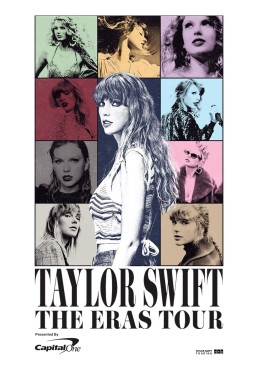The Taylor Swift Exploitation Machine

All Global Research articles can be read in 51 languages by activating the Translate Website button below the author’s name.
To receive Global Research’s Daily Newsletter (selected articles), click here.
Click the share button above to email/forward this article to your friends and colleagues. Follow us on Instagram and Twitter and subscribe to our Telegram Channel. Feel free to repost and share widely Global Research articles.
***
She doesn’t love you, she doesn’t care for you, and she doesn’t know you. But does her team pretend to, confecting an image of faux empathy and interest, sorting out the wheat from the chaff. The predatory, fan sucking phenomenon of the Taylor Swift marketing machine is something to behold. Leaving aside the sort of music that will eventually be tinned like a footnote memento of history, Swift has become a corporate phenomenon, a Mammon beast of vast scale and proportion. And like most corporate phenomena, they tend to be predatory.
A central aspect to the Swift machine is the use of a ticket sales scheme that is intended to channel tickets to the faithful. The faithful, as it were, are a sad, though dedicated bunch, deluded and easy to please. Like cultish, parched devotees, they must show their stripes by essentially promoting Swift’s brand. Purchasing merchandise related to the star is essential. They are required to drivel and slobber on social media about their object of adoration. In doing so, they stand a damn well better chance of securing pre-sale concert tickets.
In 2017, this practice was already being noted by such figures as Shikari frontman Rou Reynolds. “The most sickening thing is that this ultra-capitalistic exploitation of fans is beneath a veneer of morality – stopping ticket bots/touts.” In the view of Reynolds, “Bots/touts fleece fans by reselling tickets for a higher price. She’s not stopping them, she is replacing them. She is fleecing her own fans.”
The fleecing has been going on for some time. And fans, being the tolerant and hoodwinked creatures that they are, are willing to ignore it. Put it down to the emotional stunting of the global pandemic, the anxieties, the round-the-clock listening to the Swift oeuvre. It is for that very reason that the pop figure is earning more than $13 million from each “Eras” tour engagement ($300 million was raked in from 22 dates), and is set to draw in something like $1 billion when the tour concludes in London next year.
It is reported that Swift is charging $254 per ticket (this varies depending on venue and scale), a figure that pales before the resale figures that can reach, quite literally, into thousands of dollars. Seeing her perform will empty your wallet to an amount twice that from her 2018 “Reputation” tour, meaning that the singer has outpaced the industry average increase of $37 during that time. The secondary market of resales, which is sometimes aided by promoters who directly distribute tickets to brokers, will see staggering prices via such outlets as Stubhub. For an arena show in Minneapolis, Swift tickets were going for $900 to $12,000.
The killer feature of the Swift business model is that she offers various price differentials, and ruthlessly exploits them. Like an airline seeking a particular type of patron for hardly much in return, she offers the generic, the dull, the back-at-stadium options. But then come the florally couched “VIP packages” that include trinkets, posters, tote bags (do you feel proud of yourself?).
For the soppy, brain softened types, gooey at the prospect of greater access to their heroine, this is bound to make the wallets that much easier to purloin. And it shows. Individuals such as one @AirlineFreak (yes, don’t reveal your actual name) spoke about travelling some 8,600 miles to the US for a concert and penning on a Reddit thread confessing to paying “an eye watering $3,500 something for 2 mid-section tickets for ATL night 1.” While punishing on the expense account, to see Swift was most certainly “worth it.” You get what you deserve.
Swift certainly knows a thing or two about cash. That, at least, is the impression we are left with. She avoided a sponsorship deal with the now bankrupt crypto exchange FTX, worth $100 million, preferring to place her money in a niche mutual fund. The source for this is hedge fund manager Boaz Weinstein, who so happens to know the singer’s daddy, Scott, himself a former broker at Merrill Lynch. If you can trust hedge fund managers of any stripe, Weinstein insists that Swift “invests in discounted closed end funds”.
The focus now has been to move the pricing issue away from Swift to those fiendish ticket scalping websites, suggesting that she is somehow innocent about the very beast she has helped create. An article in CHOICE published in late June described it thus: “Limited VIP packages to Swift’s Sydney and Melbourne shows went on sale on Monday. Scalpers wasted no time in exploiting the high demand, seeking to resell the tickets at excessively high mark-ups.”
True, but the true reason that such fees are ever contemplated must rest with the besotted fans who nourish the exploitative Swift Entertainment Industry. Forget the living crisis, the leaner budgets, the climate catastrophes. A certain singer is waiting for your cash.
*
Note to readers: Please click the share button above. Follow us on Instagram and Twitter and subscribe to our Telegram Channel. Feel free to repost and share widely Global Research articles.
Dr. Binoy Kampmark was a Commonwealth Scholar at Selwyn College, Cambridge. He currently lectures at RMIT University. He is a regular contributor to Global Research and Asia-Pacific Research. Email: [email protected]
Featured image: Promotional poster for Taylor Swift’s concert tour “The Eras Tour” (Licensed under Fair Use)

